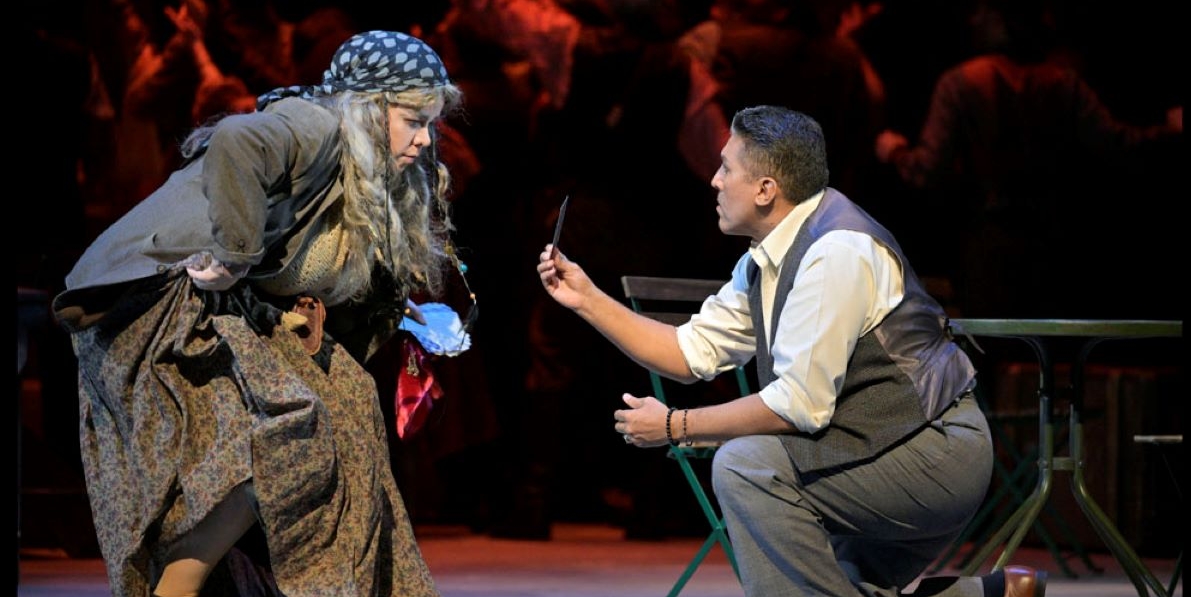Pietro Mascagni’s short opera Cavalleria Rusticana is often paired with the similar length Pagliacci. As Ruggero Leoncavallo’s opera was staged last season at the Israeli Opera, Mascagni’s verismo piece is now paired with Sergei Rachmaninoff’s Aleko, written in 1892 as a graduation work at the Moscow Conservatory. Both the Russian and the Sicilian opera tell stories of scorching passion, love, jealousy and murder, which is why director Joan Anton Rechi thought it would be a good idea not only to put them together on stage, but also treat them as if they were one dramatic whole.
Aleko, performed in the first half of the evening, is about the beautiful gypsy woman Zemfira who has fallen out of love with her older possessive Russian husband Aleko, and is now having an affair with one of her own people. In a jealous rage Aleko kills them both, and the gypsies cast him out forever. There is beautiful music but not much of a story in this opera written by the 19 year old Rachmaninoff. Rechi tells the story as is, but adds bits of scenes in which the protagonists of Cavalleria Rusticana appear as silent minor characters in Aleko. Thus the yet unnamed Turiddu and Santuzza seem to be making plans to go away together, and the carter Alfio gets a new whip in the gypsy market. After the intermission, at the beginning of Cavalleria Rusticana, the expelled Aleko is seen standing at the same spot he was when the curtain came down. He later reappears to put a weapon in Alfio’s hand when he goes to murder his wife’s lover Turiddu. Aleko’s victims also appear as the ghosts of the dead, entering the church together.
This concept might have seemed an interesting idea at first, but on stage it’s no more than a gimmick, adding nothing to the layers of operas, each sung in the original language – Russian and Italian. As numerous operas tell stories of passion, jealousy and murder, pointing to the similarity in the themes of both operas does not yield any specific insight. It does save the need to create two different sets. The classic set designed by Gabriele Moreschi is beautiful, however, with stairs leading up to the church in the background and a colorful gypsy market in the front, set up in the first act. The lighting design by Keren Granek is less cohesive, with the lights going up and down with no apparent justification.
The star of both operas was the chorus conducted by Assaf Benraf. The most gorgeous melodies and harmonies were given by both composers to the chorus, and they were sung forcefully and beautifully. However, the director didn’t seem to know how to move the members of the chorus on stage. It was painfully apparent in the market seen in Aleko, in which the chorus moved in slow motion to lame choreography while the orchestral music was lively and playful. In general the orchestra was fine, but the famous Intermezzo in the second act was hurriedly played as if the conductor Alessandro de Marchi was anxious to get home.
As for the lead singers, some were better than others. In the first half, the role of the jealous and anguished Aleko was sung by Romanian baritone Ionut Pascu who has been better in previous operas. Here his voice sounded flat. The unnamed gypsy lover was played by Ukrainian tenor Valentyn Dytiuk, who’s voice was strong but not particularly clear, and his acting was stiff. Zemfira was portrayed by the always excellent Israeli soprano Alla Vasilevitsky, while her father was Russian bass Lev Elgardt in his Israeli Opera debut. Based on the deep and dramatic voice he demonstrated, I would be looking forward to see him again.
Alfio, the jealous murderous husband in the second act, was played by baritone Elchin Azizov from Azerbaijan, also in his Israeli opera debut. He was much stronger both musically and dramatically than his counterpart in the first opera. To emphasize the similarity in their characters, the two singers sing both roles in alternate evenings. Tenor Sergey Polyakov in the role of Turiddu sounded a bit dim, and in the lead role of the jilted lover Santuzza, who mourns her lost honor, soprano Anastasia Boldyreva’s voice was not very stable. In the end pairing these two operas turned out to be not such a good idea, as Cavalleria Rusticana is a more mature and powerful on any level.

